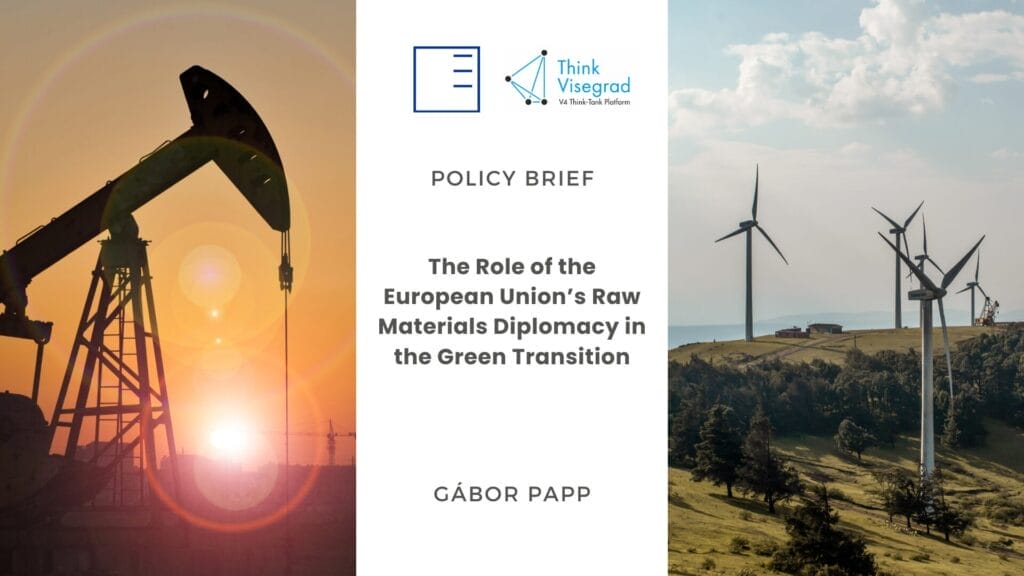Archiv článků
Prohlédněte si všechny články a objevte více zajímavých témat!

Vedoucí programu Green Europe / Seniorní výzkumný/á pracovník/ice
V Institutu pro evropskou politiku EUROPEUM hledáme vedoucí/-ho výzkumného programu Zelená Evropa se zaměřením na témata jako je klimatická politika EU, dekarbonizace průmyslu, clean tech, konkurenceschopnost EU a Česka, role EU jako globálního hráče, spravedlivá transformace, klimatická adaptace, dopravní chudoba, fondy EU, politika soudržnosti a ekonomická bezpečnost.

Impacts of the EU Emissions Trading System 2
Tento projekt se zaměřuje na zkoumání potenciálních dopadů druhé fáze Evropského systému obchodování s emisemi (ETS2) na nejzranitelnější domácnosti v Evropě, s důrazem na minimalizaci rizik, která by mohla vést k veřejnému odporu proti politikám EU zaměřeným na dekarbonizaci dopravy. Cílem aktivit projektu je přispět k širšímu začlenění konceptu dopravní chudoby, jejími příčinami a řešeními, do českého kontextu.

CNN Prima News | O emisních povolenkách na dopravu a bydlení se stále jedná
Emisní povolenky na dopravu a bydlení mají začít platit od roku 2027. Premiér Petr Fiala chce účinnost směrnice posunout alespoň o jeden rok. Naopak hnutí ANO ji hodlá úplně zrušit, pokud se dostane k moci. Když ale Česko evropskou směrnici nepřijme, hrozí mu finanční postih. Situaci komentoval pro CNN Prima News analytik Institutu EUROPEUM Filip Křenek.

iROZHLAS | ‚Orbán míří k volební prohře a snaží se získat hlasy konzervativců,‘ říká analytik
Maďarsko čekají za rok volby a předvolební průzkumy předpovídají, že by premiér Viktor Orbán se svou stranou Fidesz mohl skončit v opozici. „Orbán má nejnižší podporu od roku 2010 a uvědomuje si to. Svými kroky proti opozici, LGBT a dalším si snaží udržet konzervativní jádro svých voličů,“ říká v rozhovoru pro iROZHLAS.cz maďarský analytik Institutu EUROPEUM Oszkár Roginer-Hofmeister.

ČRo Plus | Summit Koalice ochotných: Nejdřív férové příměří, teprve potom mírové jednotky
Francie a Velká Británie vyšlou na Ukrajinu tým expertů, který má zhodnotit potřeby tamní armády. Oznámily to na summitu koalice ochotných v Paříži, kde se sešli zástupci třiceti zemí včetně české delegace vedené premiérem Petrem Fialou. Co dalšího summit přinesl? A jakým směrem se mohou ubírat mírová jednání v následujících týdnech? Pro Český rozhlas Plus situace komentoval generální ředitel Institutu EUROPEUM Martin Vokálek.

Policy Brief | Úloha surovinové diplomacie Evropské unie v zelené tranzici
V roce 2019 se zelená agenda stala vlajkovou lodí politiky Evropské komise tváří v tvář Evropské zelené dohodě. Po pěti letech znovuzvolená Ursula von der Leyenová by ráda tuto agendu zachovala jako prioritu číslo jedna i pro další politický cyklus a tento cíl vyjádřila i ve svých politických směrech. Mezitím vedly významné geopolitické události v posledních několika letech k nebývalému zájmu o bezpečnost dodávek energií a surovin. Tato témata si začala získávat značnou pozornost během pandemie Covid-19, poté dále prudce vzrostla během následujících energetických krizí a nakonec dosáhla vrcholu po vypuknutí rusko-ukrajinské války.
Přestože otázka energetické bezpečnosti a bezpečnosti dodávek má globální dopady a diskutuje se o ní celosvětově, Evropa byla těmito výše uvedenými událostmi obzvláště zasažena, píše ve svém policy briefu Gábor Papp, výzkumný pracovník Maďarského institutu mezinárodních vztahů.

CNN Prima News | Cla na auta z Evropy? Česka se zatím dotknou jen okrajově
Evropské automobilky investují v USA už desítky let, a zavedení cel proto považují za ránu pod pás. Rozhodnutí Donalda Trumpa uvalit 25% cla na automobily vyrobené mimo USA kritizuje i evropská asociace autoprůmyslu ACEA. Nové opatření podle výrobců nepřímo dopadne i na českou Škodovku a její dodavatele. Jak velký zásah to skutečně bude, záleží na konkrétním seznamu výrobků, na které se cla budou vztahovat — ten zatím znám není. Ministerstvo průmyslu a obchodu nicméně uklidňuje, že dopady na Česko by měly být spíše mírné. Pro CNN Prima News situaci komentoval analytik Institutu EUROPEUM Filip Křenek.

Tvoříme Evropu | Rozhovor s úspěšným projektem JustGreen
V historicky prvním rozhovoru jsme se potkali s Jovanou Jović Tadić, projektovou manažerkou z Institutu EUROPEUM, která představila projekt JustGreen.

ČRo Plus | Zelená dohoda versus obrana? Obě priority mohou jít ruku v ruce
V době zhoršující se bezpečnostní situace se stále častěji ozývají hlasy volající po přehodnocení rozpočtových priorit. Měli bychom místo dekarbonizace investovat více do obrany? Lze vůbec financovat Zelenou dohodu a zároveň udržet efektivní obranné kapacity? Pro Český Rozhlas Plus komentoval zástupce ředitele Institutu EUROPEUM Viktor Daněk.

CNN Prima News | Závěry Evropské rady k Ukrajině nejsou závazné, upozorňuje analytička
Podle očekávání našlo 26 vedoucích představitelů EU v otázce Ukrajiny shodu. . Text sice nepřinesl žádné nové závazky, ukázal ale „nový standard“ silných prohlášení bez souhlasu sta procent členů Evropské rady. Situaci komentuje analytička Institutu EUROPEUM Zuzana Krulichová.

Radio Prostor | Prezident Petr Pavel navštívil Moldavsko. Jaká je cesta země do Unie?
Prezident Petr Pavel se tento týden vydal do Moldavska. V rámci státní návštěvy chce řešit bilaterální vztahy obou zemí a také současnou bezpečnostní situaci v Evropě a ve světě. Vztahy Česka s Moldavskem komentoval ředitel Institutu EUROPEUM Martin Vokálek.

STVR | Summit EU: O obraně i konkurenceschopnosti
V Bruselu jednali představitelé členských zemí o nespočtu otázkách. Jedním z nich je pokračování další vojenské pomoci Ukrajině. Společné prohlášení o pokračování pomoci podpořilo dvacet šest členských států, proti bylo Maďarsko. Jakou váhu má toto prohlášení, pokud není jednomyslné? Pro STVR komentoval analytik Institutu EUROPEUM Filip Křenek.